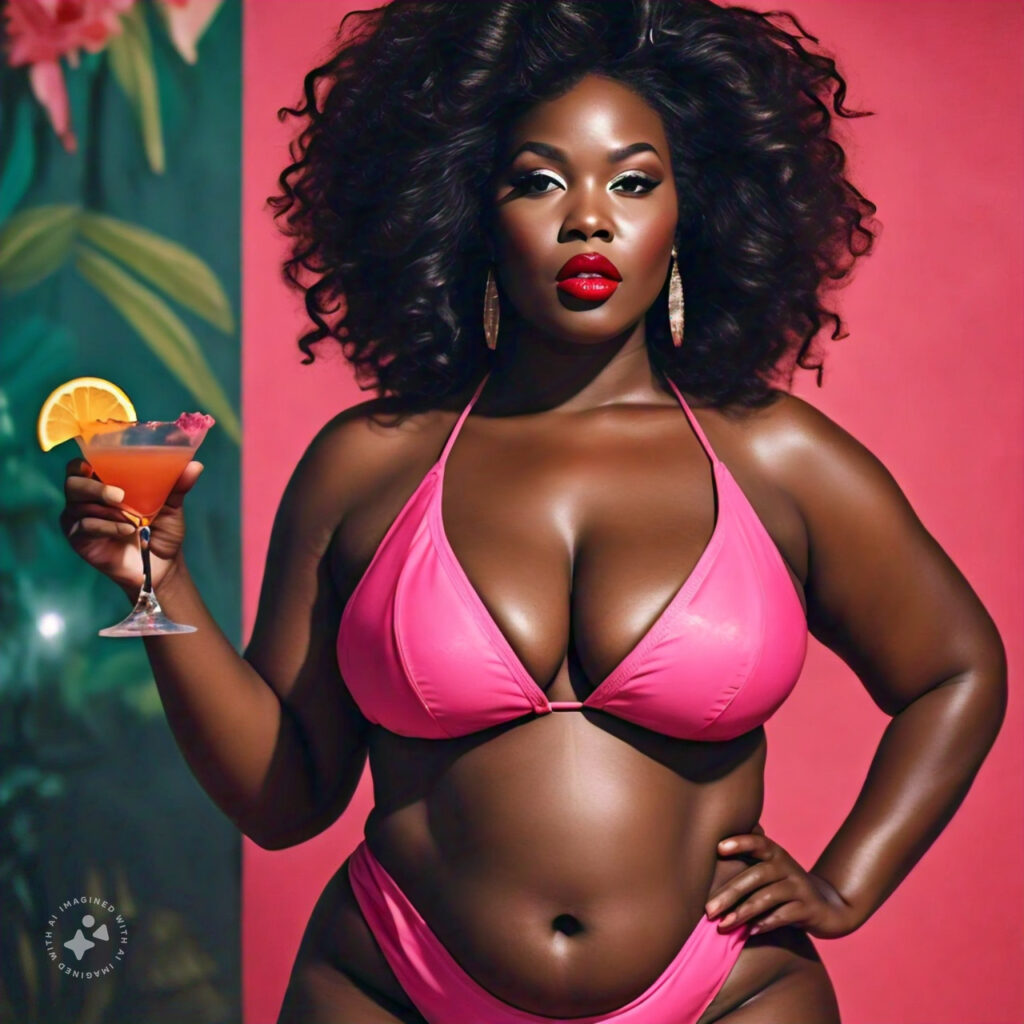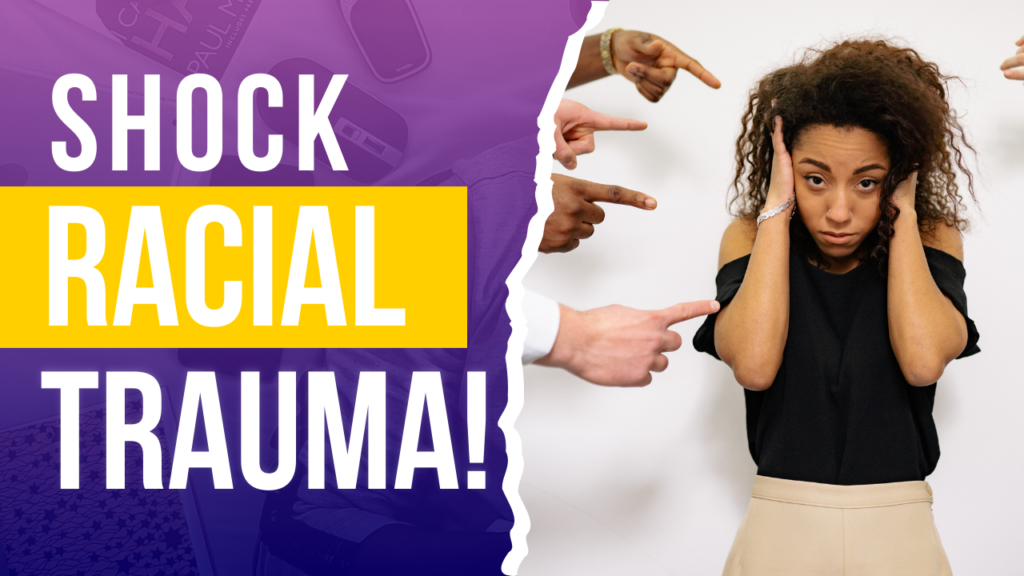
Powered By BlackTraumaGPT.com
Researched and Curated By Rev. Dr. Philippe SHOCK Matthews
(Black Trauma and Mental Health Specialist | Prompt Eng | GPT Dev | Research Scientist | Africana Phenomenologist | Black AI Corsortim co-Founder | Black Mental Health Podcast Host)

In part 3, we talked about Negative Self Talk And Body Shaming. But did you know that many of the same factors that contribute to negative self-talk, body shaming, emotional eating, and weight gain can also lead to behaviors like oversexualization and promiscuity as coping mechanisms?
YES!
Both overeating and promiscuity can be ways individuals attempt to manage underlying emotional pain, trauma, and feelings of worthlessness or inadequacy. Here’s how the dynamics of negative self-talk, body shaming, and trauma can contribute to such behaviors:
1. Trauma and Sexual Behavior
Experiences of trauma—particularly sexual trauma—are often closely linked with later patterns of hypersexuality or promiscuity. For many, early sexual abuse, violence, or coercion can lead to a disconnection between self-worth and sexuality.
- Sexual Trauma and Hypersexuality: Individuals who have experienced sexual abuse or assault may develop a complicated relationship with their bodies and their sexuality. For some, this manifests in hypersexuality or promiscuity as a way to regain control over their bodies, or as an unconscious effort to cope with unresolved trauma. In the context of Black trauma, sexual exploitation and violence are historical and systemic. These experiences, passed through generations, often result in distorted relationships with sexuality and body image.
- Oversexualization as a Defense Mechanism: For some, becoming overly sexual is a way to reclaim power or feel validated. This can be especially true for individuals who feel shame or worthlessness in other areas of their lives (e.g., body image, self-worth). Resmaa Menakem’s work on how trauma is stored in the body highlights that people sometimes develop coping strategies to deal with that stored pain, and sexual behavior can be one such coping mechanism.
2. The Role of Negative Self-Talk
Negative self-talk often leads to diminished self-esteem, making individuals more likely to engage in behaviors that reflect their poor self-image. When someone constantly tells themselves that they are unworthy, unattractive, or unlovable, they may seek validation through sexual relationships, even if those relationships are emotionally unhealthy or exploitative.
- Seeking Validation through Sex: Low self-esteem driven by negative self-talk can cause individuals to seek affirmation or attention from others, especially through sexual relationships. They may feel that their worth is tied to being desired sexually, leading to promiscuity as a way to gain temporary validation or a sense of value. This is particularly relevant in environments where societal beauty standards marginalize certain body types or racialized appearances.
- Cycle of Shame and Promiscuity: Similar to how negative self-talk and emotional eating can create a cycle of shame, the same cycle can emerge with sexual behavior. After engaging in promiscuous behavior, individuals may feel guilt or shame, leading to more negative self-talk, which in turn can trigger further attempts to seek validation through sex, creating a destructive pattern.
3. Body Shaming and Sexualization
For some, the internalized pressure from body shaming leads to hypersexuality as a way to reclaim agency or cope with feelings of inadequacy about their appearance.
- Oversexualization in Response to Body Shame: Individuals who have been body-shamed may internalize the belief that their value is tied to their sexuality. In some cases, they may become overly sexual as a way to compensate for feelings of shame or insecurity about their bodies. This is particularly true for Black women, who are often subjected to the hypersexualization of their bodies through media, historical stereotypes, and systemic oppression. Scholars like Patricia Hill Collins have discussed how the sexual objectification of Black women is rooted in colonialism and enslavement, creating deep-seated beliefs about Black women’s worth being tied to their sexual availability.
- “Performing” Sexuality: In some cases, individuals may feel pressured to perform sexually in ways that align with societal expectations of attractiveness, even if it doesn’t align with their emotional needs. For example, Black women and girls are often bombarded with sexualized images and messages, leading them to believe that their value comes from being sexually available. This internalization of external body shaming can lead to sexual behavior that may be harmful or disconnected from their own emotional needs.
4. The Intersection of Race, Trauma, and Sexuality
For Black people, the intersection of racial trauma, body shaming, and sexuality plays a critical role in these behaviors. The legacy of enslavement, where Black bodies were commodified and sexualized, continues to shape how Black people, particularly women, are viewed and how they view themselves. The stereotype of the “Jezebel”—a hypersexualized Black woman—has long been used to justify both sexual exploitation and the dehumanization of Black women.
- Coping with Stereotypes: In response to this long history of sexual objectification, some Black women may feel the need to overperform or internalize these hypersexual stereotypes as a way to cope with the pressures of societal expectations. Dr. Beverly Daniel Tatum discusses how racial identity and self-perception are deeply influenced by societal messages, and for some, hypersexual behavior may be a way to navigate or rebel against these imposed narratives.
- Post-Traumatic Slave Syndrome (PTSS): Dr. Joy DeGruy’s work on PTSS explores how the trauma of enslavement and systemic racism impacts Black people’s health, relationships, and behaviors, including sexual behaviors. Hypersexuality or promiscuity may emerge as one of the coping mechanisms rooted in generational trauma, where trauma responses manifest in behaviors that aim to protect, cope, or regain control over one’s body.
5. Healing from Hypersexuality and Promiscuity
Understanding the root causes of these behaviors is critical to addressing them in a healthy and transformative way. Healing requires a multi-faceted approach that addresses both the psychological wounds of trauma and the systemic issues that perpetuate harmful behaviors.
- Trauma-Informed Therapy: Healing from hypersexual behavior often involves addressing the underlying trauma, whether it’s sexual abuse, body shaming, or chronic low self-esteem. Trauma-informed therapy helps individuals unpack how trauma has influenced their sexual behavior and supports them in developing healthier ways of connecting with their bodies and relationships.
- Rebuilding Self-Worth: Learning to challenge and change negative self-talk is key to breaking the cycle of promiscuity driven by low self-esteem. Practices like affirmations, self-compassion exercises, and mindfulness can help individuals reconnect with their self-worth beyond their sexual behavior or body image.
- Cultural Reclamation: For Black people, healing also involves reclaiming autonomy over their bodies and narratives. Body positivity movements within Black communities, and initiatives that center Black beauty and diverse body types, help counteract the harmful stereotypes that contribute to hypersexualization. Affirming cultural practices, such as connecting to ancestral healing traditions, can also be powerful in healing sexual trauma and its associated behaviors.
Negative self-talk, body shaming, and trauma significantly contribute to hypersexuality and promiscuity in many individuals, particularly those from marginalized communities like Black women. These behaviors often arise from deep emotional wounds, unresolved trauma, and societal pressures that distort how individuals view their self-worth and bodies. Healing from these patterns requires trauma-informed care, cultural affirmation, and community support to address the emotional and psychological roots of these behaviors and to foster a healthier relationship with one’s body and sexuality.
Black Celebrities Who Fall Into This Category
There have been several Black celebrities who have openly discussed their struggles with body image, negative self-talk, body shaming, and, in some cases, hypersexualization or promiscuity. These discussions often reveal how deeply societal pressures, trauma, and self-worth impact individuals in the public eye. Below are some notable Black celebrities who have shared their experiences, along with some of their powerful quotes:
1. Lizzo
Lizzo is known for being a strong advocate of body positivity and self-love, but she has also opened up about the difficulties she has faced in terms of body shaming, particularly as a Black woman in the public eye. Her music and public statements often push back against Eurocentric beauty standards and celebrate body diversity.
- Notable Quotes:
- “I’m working on accepting love for myself as I am right now. I struggle with body dysmorphia, and I’ve been working on it for a long time. I love my body.”
- “I don’t want to be the token big girl. I want to be my own person and I want to be more than that.”
Lizzo’s openness about body dysmorphia and the emotional toll of being body-shamed ties into the concept of negative self-talk. While she promotes self-love, her journey reflects the struggles many Black women face in feeling inadequate due to societal pressures.
2. Gabourey Sidibe
Gabourey Sidibe, an actress best known for her role in Precious, has been candid about her battle with body image issues and self-esteem struggles, which have often been exacerbated by the media’s scrutiny of her weight.
- Notable Quotes:
- “I live in my body. I know what my body looks like. I know how unhealthy I am. You don’t need to remind me.”
- “People always ask me, ‘How are you so confident?’… I got tired of feeling worthless. I got tired of hating myself.”
Sidibe’s words highlight the pain of body shaming and how it can feed into negative self-talk and feelings of worthlessness. Her journey toward self-acceptance has been a public one, demonstrating how body shaming can drive people into patterns of self-protection, whether through weight gain or, for others, promiscuity.
3. Keke Palmer
Keke Palmer has opened up about her experiences with hypersexualization in Hollywood, especially as a young Black woman, and how that affected her relationship with her body and sexuality. She has spoken out about the pressures to conform to certain sexualized roles and how it contributed to feelings of inadequacy.
- Notable Quotes:
- “People think because I’m a child star that I don’t have real problems. But growing up in the industry, I was hypersexualized at a young age.”
- “I realized I didn’t have to be sexy for anyone but myself. Once I figured that out, it changed how I viewed my body.”
Palmer’s comments reflect how Black women in entertainment are often hypersexualized, leading to identity struggles and behaviors where sexuality is used as a means of validation or power. Her acknowledgment of this dynamic shows how hypersexualization intersects with issues of body image and self-worth.
4. Cardi B
Cardi B has been open about her experiences with hypersexuality, and in her earlier life, she often used her body and sexuality for survival while working as a stripper. She has spoken about how her past influenced her sense of self-worth and led her to view sex and her body as tools to navigate the world.
- Notable Quotes:
- “When I was a stripper, I felt like I didn’t really have self-esteem. I was putting on a show.”
- “I feel like sometimes I don’t know what real love is because I’ve used my body so much. Now I’m trying to figure out what that means.”
Cardi B’s journey from using her body for survival in a hypersexualized context to finding her own self-worth reflects the broader discussion of how trauma, economic pressure, and societal expectations shape behaviors like hypersexuality. She has often acknowledged that her past shaped her understanding of sexuality and self-esteem, and she continues to navigate these themes in her public persona.
5. Megan Thee Stallion
Megan Thee Stallion, known for her bold embrace of her sexuality, has spoken about the complexities of being both hypersexualized and owning her sexuality as a Black woman. While she celebrates her body and sexual freedom, she has also discussed how she has been judged and critiqued for these expressions.
- Notable Quotes:
- “I’m a big advocate for women being comfortable in their own skin and loving themselves.”
- “People act like because I’m owning my body and my sexuality, I’m doing it for men, but I’m doing it for me.”
Megan Thee Stallion’s reflections align with the idea of reclaiming one’s body and sexuality in the face of societal and racial pressures. Her emphasis on owning her sexuality contrasts with the harmful stereotypes that often sexualize Black women without their consent, showing how complicated it can be to navigate self-expression and external objectification.
The experiences shared by these Black celebrities illustrate how negative self-talk, body shaming, and hypersexualization can deeply affect a person’s relationship with their body and their sexuality. While many of these celebrities have found ways to reclaim their narratives and celebrate their bodies, their journeys also reveal the trauma and emotional toll that come with societal pressures and scrutiny. These quotes and stories provide insight into the complex relationships between body image, sexuality, and self-worth, particularly for Black women who face unique intersections of racism, sexism, and objectification.
If nothing is wrong with you and something happened to you…are you ready to find out what to do about it? Shock Trauma Spiritual Counseling Discovery Call https://t.ly/VJWqJ | BlackTraumaGPT.com: Beginner’s User Guide https://t.ly/HtHMX | Programming chatGPT for Black Self Mental Health, Trauma, and Healing https://amzn.to/47P8MXK
Enjoying Our Content?
Become a member of our Patreon to get the latest research on Racial Black Trauma https://www.patreon.com/revshock. Or buy Rev. SHOCK a Coffee! https://bit.ly/3yg5D7A


Book A Discovery Call
Are you ready to SHOCKtrauma? Click HERE now to book a discovery call with Rev. Dr. Philippe SHOCK Matthews

Get Social with Doc SHOCK:
PATREON: https://t.ly/mjksf | REV. DR. SHOCK (PERPLEXITY PAGE): https://t.ly/ppjwh | SOLO: https://solo.to/revshock | BIO: https://t.ly/Ko_y_ | BLOG: https://t.ly/j6bh0 | PODCAST: https://t.ly/cB5GD | ENDORSEMENT: https://t.ly/jFErO | THREADS: https://t.ly/SoKkT | IG: https://t.ly/XsN8f | FB: https://t.ly/R3r9Y | X: https://t.ly/iJ-wy | LINKEDIN: https://t.ly/GZ0pe | TIKTOK: https://t.ly/zfp60 | BLACK TRAUMA GPT: https://t.ly/vswbs | BLACK AI CONSORTIUM: https://t.ly/uiRZN | BOOKS BY PM: https://t.ly/vvHMd
